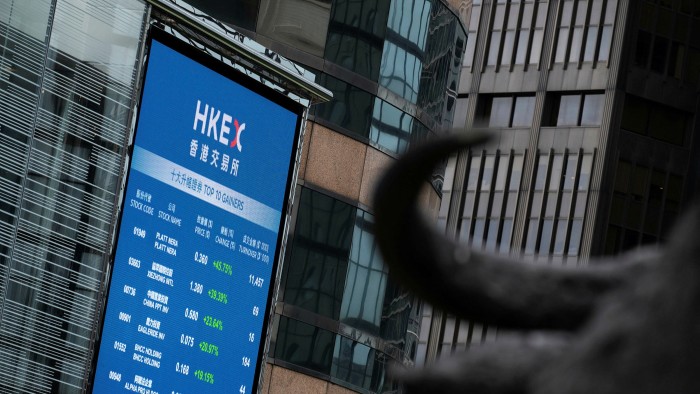US banks to delist hundreds of HK-listed products under Trump rules

Roula Khalaf, Editor of the FT, selects her favourite stories in this weekly newsletter.
JPMorgan, Morgan Stanley and Goldman Sachs are set to delist 500 structured products from Hong Kong’s stock exchange, as the fallout from President Donald Trump’s executive order barring investment in companies with alleged links to China’s military widens.
During his final days in office, Mr Trump has sought to crack down on Beijing before Democratic president-elect Joe Biden is inaugurated later this month.
In addition to banning the purchase of shares of dozens of Chinese companies believed to be tied to the People’s Liberation Army, the outgoing president has also moved to restrict transactions with Chinese payment applications including Alipay, WeChat Pay and Tencent’s QQ Wallet.
The move by the banks follows a decision by MSCI on Friday to drop Chinese state-owned telecoms companies China Mobile, China Telecom and China Unicom from their closely followed stock benchmarks to avoid potential legal penalties stemming from the executive order, which is set to go into effect on January 11.
Hong Kong Exchanges and Clearing said the decision to delist 500 structured products was a “direct result” of the US sanctions, adding that it would continue to monitor developments.
“HKEX is working closely with the relevant issuers to ensure orderly delisting, and facilitate buyback arrangements being arranged by the issuers,” it said on Sunday. “We do not believe this will have a material adverse impact on Hong Kong’s structured products market, the largest in the world with over 12,000 listed products.”
On Monday, the manager of the Tracker Fund of Hong Kong, the city's largest exchange-traded fund by assets, announced it would not make any new investments in a US sanctioned company.
State Street Global Advisors said it was “no longer appropriate for US persons” to invest in the tracker fund, which closely follows Hong Kong’s Hang Seng index.
The fund owns shares in the Hong Kong listings of China Mobile and China Unicom, which are among the sanctioned companies on the US blacklist.
Last week the New York Stock Exchange confirmed that the two companies, along with China Telecom, would be delisted as a result of the sanctions.
The Hang Seng index was little changed on Monday. Shares in China Mobile and China Unicom closed almost 6 per cent higher, while China Telecom rose 1.5 per cent.
In its efforts to avoid breaching the same regulations, the New York Stock Exchange became embroiled in controversy, moving at first to delist the three Chinese telecoms and then reversing course, before deciding to follow through last week at the urging of the Treasury department.
Lawyers and financial executives have heaped criticism on the Trump administration for introducing ambiguously worded rules and guidance over how the restrictions will be enforced. Investors have also expressed concerns about the confusion sown in recent weeks.
“This kind of uncertainty is not appealing for any long-term investor, especially when one is trying to invest in Chinese state-owned telecom companies,” said Deepak Puri, chief investment officer of the Americas for Deutsche Bank Wealth Management.

Comments